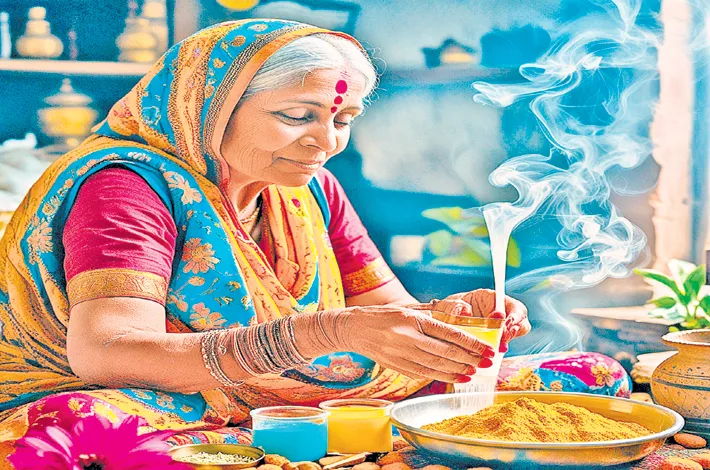Indian grandma remedies: timeless wisdom for everyday ailments
27-05-2025 12:00:00 AM

Indian gooseberry, or amla, is a grandma’s secret for lustrous hair and glowing skin. Whether eaten raw, juiced, or applied as a hair mask with shikakai and reetha, amla’s high vitamin C content strengthens hair follicles and boosts collagen production. Grandmas often mix amla powder with yogurt for a face mask to reduce pigmentation
In India, grandmothers—lovingly called nani, dadi, or amma—are the unsung heroes of home remedies, wielding a treasure trove of natural cures passed down through generations. Rooted in Ayurveda, folk traditions, and practical wisdom, these remedies reflect a deep understanding of nature’s healing properties. From soothing a sore throat to boosting immunity, Indian grandma remedies are a blend of science, tradition, and love. This article explores some of the most cherished remedies, their cultural significance, and their enduring relevance in modern times.
The Essence of Indian Grandma Remedies
Indian grandma remedies are more than just quick fixes; they’re a way of life. Drawing from Ayurveda, India’s ancient system of medicine, and regional traditions, these remedies emphasize balance, prevention, and the use of readily available ingredients. Grandmothers often rely on kitchen staples like turmeric, ginger, honey, and cumin, transforming them into potent cures. These remedies are not only cost-effective but also reflect a sustainable approach to health, using natural resources with minimal processing.
The cultural significance of these remedies lies in their accessibility and communal nature. In Indian households, health advice is shared across generations, with grandmothers acting as the custodians of this knowledge. Their remedies are often accompanied by stories, rituals, and a dash of affection, making them as emotionally comforting as they are physically effective. While modern medicine has its place, these time-tested solutions continue to thrive, especially for minor ailments.
Common Indian Grandma Remedies Here’s a look at some classic remedies that have soothed generations of Indians:
1. Turmeric Milk for Coughs and Colds
Known as haldi doodh, turmeric milk is a go-to remedy for colds, coughs, and sore throats. A glass of warm milk mixed with a teaspoon of turmeric powder, a pinch of black pepper, and a drizzle of honey is a powerful concoction.
Turmeric’s curcumin has anti-inflammatory and antimicrobial properties, while black pepper enhances its absorption. Honey soothes the throat, and warm milk aids sleep. Grandmas often insist on drinking this at bedtime, claiming it works wonders overnight. Modern science backs this remedy, with studies confirming turmeric’s role in boosting immunity and reducing inflammation.
2. Ginger Tea for Digestion and Nausea
Indian grandmothers swear by adrak wali chai (ginger tea) for digestive issues, nausea, or even a sluggish morning. Fresh ginger is grated into boiling water with tea leaves, milk, and sometimes cardamom or tulsi (holy basil). Ginger’s active compounds, like gingerol, help stimulate digestion, reduce bloating, and alleviate nausea. For an extra kick, some grandmas add a pinch of black pepper or cloves. This remedy is especially popular during monsoon season when digestive troubles are common due to humidity and dietary changes.
3. Tulsi for Immunity and Respiratory Health
Holy basil, or tulsi, is revered in Indian households as a sacred plant with medicinal powers. For colds, allergies, or respiratory issues, grandmas recommend chewing fresh tulsi leaves or brewing a tea with tulsi, ginger, and honey. Tulsi is rich in antioxidants and has adaptogenic properties, helping the body combat stress and infections. In many homes, a tulsi plant is grown in the courtyard, and its leaves are used daily to boost immunity. Grandmas often say, “Tulsi rakhe rogbhag” (Tulsi keeps diseases at bay), a belief supported by studies showing its antiviral and anti-inflammatory effects.
4. Cumin Water for Bloating
For bloating or indigestion, grandmas often suggest jeera water—a simple infusion of roasted cumin seeds boiled in water. Cumin stimulates digestive enzymes, reduces gas, and soothes the stomach. Some add a pinch of rock salt or ajwain (carom seeds) for extra potency. This remedy is a staple after heavy meals, especially during festive seasons when rich foods like biryani or kheer are common. Drinking jeera water first thing in the morning is also believed to detoxify the body and kickstart metabolism.
5. Coconut Oil and Camphor for Aches
For muscle aches, joint pain, or headaches, grandmas often turn to a warm massage with coconut oil infused with camphor. The oil’s fatty acids penetrate the skin, while camphor provides a cooling sensation that relieves pain. This remedy is especially popular for children with growing pains or elderly family members with arthritis. The massage, often done with gentle storytelling, doubles as a bonding ritual, making it as therapeutic for the soul as it is for the body.
6. Amla for Hair and Skin
Indian gooseberry, or amla, is a grandma’s secret for lustrous hair and glowing skin. Whether eaten raw, juiced, or applied as a hair mask with shikakai and reetha, amla’s high vitamin C content strengthens hair follicles and boosts collagen production. Grandmas often mix amla powder with yogurt for a face mask to reduce pigmentation. This remedy is particularly popular in rural areas where amla trees are common, and its effectiveness is now recognized in modern haircare products.
The Science Behind the Wisdom
While these remedies are rooted in tradition, many have scientific backing. Turmeric’s curcumin, ginger’s gingerol, and tulsi’s eugenol have been studied for their anti-inflammatory, antimicrobial, and antioxidant properties. Cumin and ajwain aid digestion by stimulating enzyme production, and amla’s vitamin C supports immunity and skin health. The placebo effect also plays a role—grandma’s love and confidence in her remedies can boost psychological well-being, enhancing recovery.
However, these remedies are best suited for minor ailments. Serious conditions require professional medical attention, and grandmas often acknowledge this, blending their wisdom with practicality. For instance, a grandma might suggest turmeric milk for a cold but insist on a doctor’s visit if symptoms persist.
Why Grandma Remedies Endure
In an era of over-the-counter drugs and instant solutions, Indian grandma remedies remain relevant for their simplicity, affordability, and holistic approach. They empower individuals to take charge of their health using ingredients found in every kitchen. Moreover, these remedies foster a sense of cultural identity and familial bonding. The act of a grandmother preparing haldi doodh or massaging a grandchild’s forehead is as much about love as it is about healing.
Urbanization and modern lifestyles have led to a decline in some traditional practices, but there’s a resurgence of interest, especially among younger generations. Social media platforms like X are buzzing with posts about “dadi ke nuskhe” (grandma’s remedies), with influencers sharing recipes for turmeric lattes or tulsi tonics. This revival reflects a global trend toward natural and sustainable living, with Indian remedies finding fans worldwide.
Challenges and Considerations
While grandma remedies are generally safe, they’re not without risks. Incorrect dosages, allergies, or interactions with medications can pose problems. For example, excessive turmeric can cause stomach upset, and tulsi may not suit everyone. It’s wise to consult a healthcare professional, especially for chronic conditions or during pregnancy.
Additionally, not all remedies are universally effective. What works in one region or for one person may not suit another due to differences in climate, diet, or genetics. Grandmas often tailor remedies to individual needs, a nuance that requires understanding and experience.
Conclusion
Indian grandma remedies are a beautiful blend of tradition, science, and care. From the golden glow of haldi doodh to the soothing aroma of jeera water, these cures offer more than physical relief—they connect us to our roots, our families, and the wisdom of those who came before us.
As modern medicine advances, these remedies remind us of the power of simplicity and the healing touch of a grandmother’s love. Whether you’re battling a cold or seeking glowing skin, there’s likely a nuskha in your grandma’s repertoire waiting to work its magic. So, the next time you feel under the weather, reach for that turmeric or ginger—and maybe give your grandma a call.








